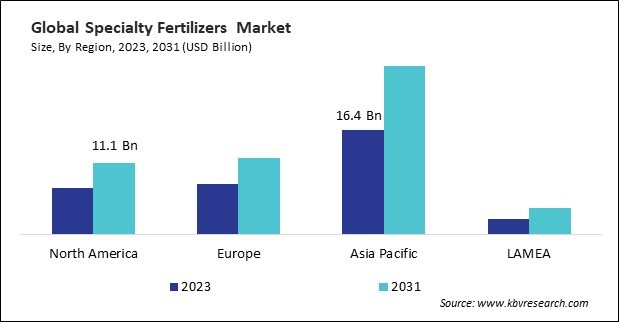According to a new report, published by KBV research, The Global Specialty Fertilizers Market size is expected to reach $53.4 billion by 2031, rising at a market growth of 6.0% CAGR during the forecast period. In the year 2023, the market attained a volume of 96,157.1 kilo tonnes, experiencing a growth of 15.0% (2020-2023).
The Cereals & Grains segment is generating the highest revenue in the Global Specialty Fertilizers Market by Crop Type in 2023; thereby, achieving a market value of $22.4 billion by 2031. Cereals & grains have specific nutrient requirements at different growth stages to support optimal growth, yield, and grain quality. For example, according to the data released by the World Bank, cereal crop production in China increased by 632,066,911 metric tons in 2021. Specialty fertilizers formulated with precise nutrient ratios and compositions can address these requirements more effectively than conventional fertilizers, maximizing crop productivity and profitability.

The Foliar segment is registering a CAGR of 6.2% during (2024 - 2031). Foliar-applied specialty fertilizers offer a rapid response compared to soil-applied fertilizers, as nutrients are absorbed and translocated within the plant more quickly. This rapid nutrient uptake can address deficiencies, correct imbalances, and support plant growth and development when immediate action is needed, such as during stress or nutrient demand. Foliar-applied specialty fertilizers improve nutrient use efficiency by minimizing nutrient losses associated with soil application methods. The foliar application reduces the risk of nutrient leaching, volatilization, and immobilization in the soil, maximizing the utilization of applied nutrients and reducing environmental impacts like nutrient runoff and groundwater contamination.
The Water-soluble Fertilizers segment is leading the Global Specialty Fertilizers Market by Technology in 2023; thereby, achieving a market value of $29.2 billion by 2031. Water-soluble fertilizers can be precisely formulated to deliver specific ratios and concentrations of nutrients required by different crops and growth stages. This precision allows farmers to tailor their fertilization programs to meet the exact nutritional needs of their crops, optimizing yield, quality, and profitability. Water-soluble fertilizers are highly compatible with irrigation systems such as drip irrigation and fertigation. They can be easily dissolved and injected into irrigation water, allowing for precise and uniform nutrient application directly to the root zone of plants. integration with irrigation systems enhances nutrient distribution and uptake efficiency, particularly in irrigated agriculture.
The Calcium Ammonium Nitrate segment is experiencing a CAGR of 6.9% during (2024 - 2031). Calcium is essential for maintaining soil structure, pH balance, and nutrient availability. Including calcium ammonium nitrate (CAN) fertilizers can improve soil health and fertility, creating opportunities for specialty fertilizers that focus on soil amendment and enhancement. CAN can be combined with other nutrients and additives to create specialty fertilizer blends customized for specific crops and growth conditions. The growth of the CAN may encourage manufacturers to develop specialty fertilizer formulations that incorporate CAN as a component, offering farmers a more comprehensive nutrient management solution.
Full Report: https://www.kbvresearch.com/specialty-fertilizers-market/
The Asia Pacific region dominated the Global Specialty Fertilizers Market by Region in 2023, and would continue to be a dominant market till 2031; thereby, achieving a market value of $26.3 billion by 2031. The Europe region is anticipating a CAGR of 5.4% during (2024 - 2031). Additionally, The North America region would exhibit a CAGR of 5.7% during (2024 - 2031).
By Crop Type (Volume, Kilo Tonnes, USD Billion, 2020-2031)
By Application (Volume, Kilo Tonnes, USD Billion, 2020-2031)
By Technology (Volume, Kilo Tonnes, USD Billion, 2020-2031)
By Type (Volume, Kilo Tonnes, USD Billion, 2020-2031)
 Unique Offerings
Unique Offerings